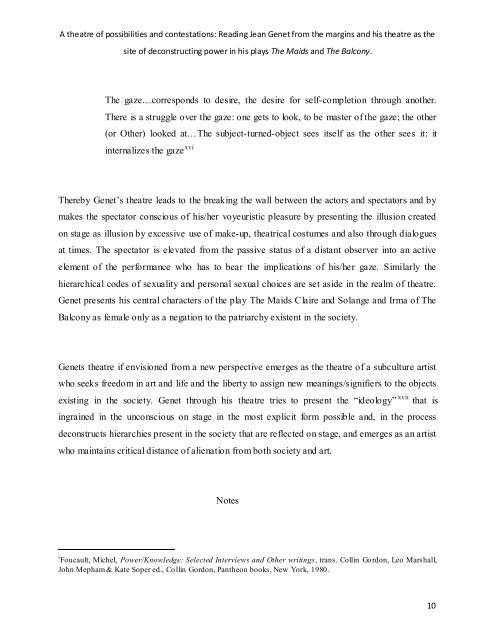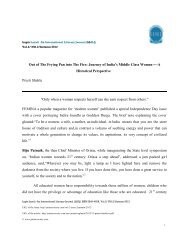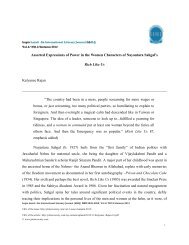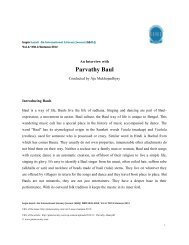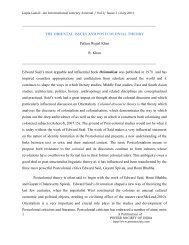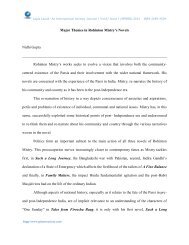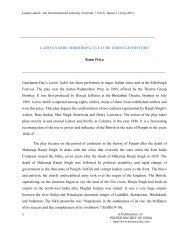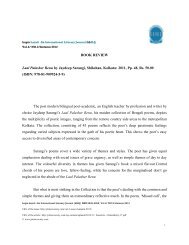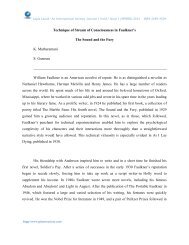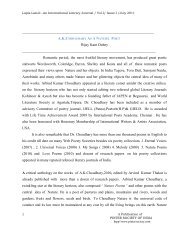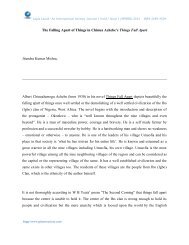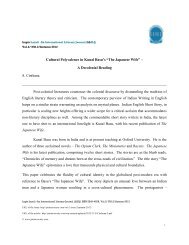A theatre of possibilities and contestations: Reading ... - lapis lazuli
A theatre of possibilities and contestations: Reading ... - lapis lazuli
A theatre of possibilities and contestations: Reading ... - lapis lazuli
Create successful ePaper yourself
Turn your PDF publications into a flip-book with our unique Google optimized e-Paper software.
A <strong>theatre</strong> <strong>of</strong> <strong>possibilities</strong> <strong>and</strong> <strong>contestations</strong>: <strong>Reading</strong> Jean Genet from the margins <strong>and</strong> his <strong>theatre</strong> as thesite <strong>of</strong> deconstructing power in his plays The Maids <strong>and</strong> The Balcony.The gaze…corresponds to desire, the desire for self-completion through another.There is a struggle over the gaze: one gets to look, to be master <strong>of</strong> the gaze; the other(or Other) looked at…The subject-turned-object sees itself as the other sees it: itinternalizes the gaze xviThereby Genet‟s <strong>theatre</strong> leads to the breaking the wall between the actors <strong>and</strong> spectators <strong>and</strong> bymakes the spectator conscious <strong>of</strong> his/her voyeuristic pleasure by presenting the illusion createdon stage as illusion by excessive use <strong>of</strong> make-up, theatrical costumes <strong>and</strong> also through dialoguesat times. The spectator is elevated from the passive status <strong>of</strong> a distant observer into an activeelement <strong>of</strong> the performance who has to bear the implications <strong>of</strong> his/her gaze. Similarly thehierarchical codes <strong>of</strong> sexuality <strong>and</strong> personal sexual choices are set aside in the realm <strong>of</strong> <strong>theatre</strong>.Genet presents his central characters <strong>of</strong> the play The Maids Claire <strong>and</strong> Solange <strong>and</strong> Irma <strong>of</strong> TheBalcony as female only as a negation to the patriarchy existent in the society.Genets <strong>theatre</strong> if envisioned from a new perspective emerges as the <strong>theatre</strong> <strong>of</strong> a subculture artistwho seeks freedom in art <strong>and</strong> life <strong>and</strong> the liberty to assign new meanings/signifiers to the objectsexisting in the society. Genet through his <strong>theatre</strong> tries to present the “ideology” xvii that isingrained in the unconscious on stage in the most explicit form possible <strong>and</strong>, in the processdeconstructs hierarchies present in the society that are reflected on stage, <strong>and</strong> emerges as an artistwho maintains critical distance <strong>of</strong> alienation from both society <strong>and</strong> art.Notesi Foucault, Michel, Power/Knowledge: Selected Interviews <strong>and</strong> Other writings, trans. Collin Gordon, Leo Marshall,John Mepham & Kate Soper ed., Collin Gordon, Pantheon books, New York, 1980.10


